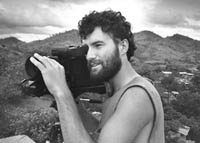
Documentary | Filmmaking | Interviews | Massachusetts
Filmmaking for Change
Written by Francine Latil | Posted by: Anonymous
For over 20 years, Robbie Leppzer has been making independent documentary films about regular people taking on greater social forces in a struggle towards positive social change. Working both locally and abroad, Leppzer’s work builds bridges between varying perspectives and cultures, and his studies of grassroots activism show that individuals can make a difference against national or corporate powers. As an alternative to mainstream media, he hopes these images will teach his audiences about meaningful social transformation, bringing every viewer towards greater awareness and perhaps drawing some into activism.
Leppzer’s dedication to examining important social issues started in the late 1970s when he produced a weekly news-radio program at his high school in Winchester, MA. After working in radio documentary, he made his first film in 1978 while in college; titled "Seabrook 1977," it focused on protests against the construction of a nuclear power plant. In more than a dozen films since, his work has portrayed people in New England and Central America struggling with issues of civil disobedience, the peace effort, labor issues, and environmentalism. These projects have touched on a variety of concerns while maintaining a common theme — that people can make a difference by working together and speaking up.
Leppzer’s most recent film, "An Act of Conscience," premiered at the 1997 Sundance Film Festival and was broadcast nationally on the Cinemax Series Reel Life. This feature-length piece portrays a Massachusetts couple whose refusal to pay federal taxes as a protest against military spending led to the loss of their home. The film, narrated by Martin Sheen, chronicles this couple’s commitment to pacifism and civil disobedience and their nonviolent efforts to keep their house in the face of government seizure.
Leppzer has dedicated his life to "making films about people who stick their necks out and take risks for social change." But, as for most independent filmmakers, it hasn’t been easy. Even with his success he notes that independent documentary filmmakers, especially those working on critical social issues, face a continual struggle for funding. Leppzer says each documentary filmmaker, even among fellow directors who reached the top at the Sundance documentary competition, still faces an uphill battle for financial survival.
Yet recent developments have helped independent documentary filmmakers. Procuring funding may be harder, but getting films out there has been aided by the growth in distribution opportunities. Also, "The development of digital video has been a real boon for independents like me," says Leppzer, as it allows him to shoot high quality footage at a very low cost. He has seen activist filmmaking take big steps forward thanks to the accessibility afforded by DV and new avenues of distribution.
Cable television offers some opportunities, Leppzer says, but not enough. His own film was shown nationally on Cinemax, but he notes that television remains a very limited venue for independent documentary broadcast, especially for documentaries concerning social issues. The "Reel Life" series, PBS’s "POV" series, and the Sundance Channel’s documentary series each only show 10 to 12 documentaries a year — a thin number compared with the hundreds of hours of documentary programming each year in Canada, England, and France.
What’s the reason for the relative dearth of documentary programming and funding in the US? Leppzer makes no bones about it. "There’s censorship of documentary work in the US because of funding priorities, particularly of big corporations." Abroad, he says, there’s an understanding of the value of documentaries, but in the US, "Funding sets the agenda and there’s a bias against presenting issues."
Leppzer offers the example of the Sundance Film Festival, which gives equal weight to narrative films and documentaries, where lively, engaged audiences attend documentary screenings. Yet the press and distributors largely ignore the documentary competition out of a belief that there’s no money to be made from them. As Leppzer points out, if documentaries aren’t promoted, they don’t make any money.
"In my experience," he says, "documentaries can be just as engaging as narrative films." Even more so, because they’re well made, well-produced representations of real people living real lives. He believes the press has an obligation to focus on documentaries so that funding sources will see that promoting documentary films is a worthy enterprise.
"Documentaries are a powerful medium for communication that is mostly wasted by the corporate media, which distracts us from major issues while promoting consumerist values that are opposite to how we need to be living on this planet," Leppzer says. However he’s heartened by recent displays of grassroots activism in this country, from the protests at the WTO, to the growing support for Ralph Nadar’s campaign. He’s excited that young people are building solidarity with those in the US and around the world who have not benefited from the privileges of the US economy. He’s inspired by the reawakening of activism and the recognition that democracy can’t work in a world where corporate interests run everything. "It makes the activist orientation of my films all the more worthwhile," he comments.
Future projects for Leppzer include a film called "Ashes and Light," about a gathering at Auschwitz concentration camp of a mixed group of European, Japanese, and US citizens. The film will portray a contemporary generation of Jews, Christians, and Buddhists, some children of Holocaust survivors, and some children of Nazis, all confronting the past. He also plans to assemble footage of indigenous people in Guatemala for a future documentary about Mayan life.
A filmmaker of strong opinions, Leppzer makes independent documentary films to inspire people to work for change. In the shifting face of our nation’s politics, his focus on social issues and activism increasingly speak to a growing grassroots audience, and will hopefully prove a cornerstone in a new movement reaching for social transformation.
Since 1985 Leppzer has run his own production and distribution company, Turning Tide Productions (www.turningtide.com) based in Wendell, MA. He brings his work to larger audiences through screenings, lectures, and workshops at colleges and schools, museums, community organizations and other venues. He is currently available for speaking engagements, and can be reached at leppzer@turningtide.com or at 1-800-557-6414. His films are available at BuyIndies.com.









